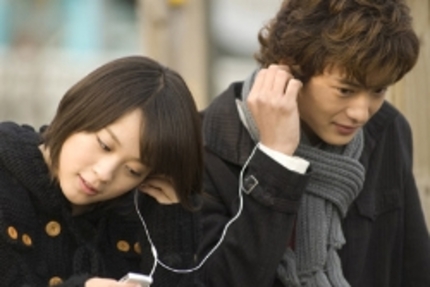Japan Cuts Review: HALFWAY

[Our thanks to Christopher Bourne for the following review.]
“Go Don’t.” In a late scene in Eriko Kitagawa’s lovely and bittersweet high school romance Halfway, love-struck senior Hiro (Kii Kitano) scrawls these two Japanese characters on a piece of paper, a gesture that perfectly expresses her confusion over whether to let her boyfriend Shu (Masaki Okada) go to college in Tokyo, far from her hometown of Hokkaido. Hiro, in the waning days of the school year, has finally landed the dreamy basketball star she has been pining after for a very long time. This happens by very serendipitous circumstances, when she feels faint while watching Shu at a game and has to see the school nurse. Hiro relates excitedly to her friend Meme (Riisa Naka) her intention to finally tell him how she feels, and soon after goes to sleep. When she awakens, she talks of her dream in which she finally gets the courage to express her love to Shu. Unbeknownst to her, Shu has been listening, also at the nurse’s office to fix a nosebleed. Later, Shu approaches Hiro and asks her out. Hiro plays coy at first, but finally cannot hide her excitement that her dream has come true. This euphoria comes to an abrupt end when one of Shu’s friends tells her that he has applied to Waseda College in Tokyo, while Hiro is set to attend a local university.
This scenario would at first seem to contain the hoariest of dippy romantic clichés that have infected a thousand teen films before this one. However, TV drama writer (Long Vacation, Beautiful Life, Orange Days) and first-time filmmaker Kitagawa has constructed from these unpromising materials an exquisite film that feels as if this story has been told for the first time. Halfway is uncannily attuned to the rhythms and subtle changes of this young couple’s relationship, with all the petty squabbling, mind games, self-conscious posturing, and unbridled emotionalism this entails. Suggesting a distinctly Japanese brand of mumblecore, Halfway uses improvisation and ad-libbed dialogue to make what we see on screen feel almost like a documentary. With its nearly entirely handheld camera, and very long exchanges of dialogue, the film beautifully captures the delicate nature of the brief moment of time the film depicts. Kitagawa is a protégé of Shunji Iwai, who served as producer, co-editor, and mentor on this project, and who has crafted some potent romances of his own (Love Letter, April Story, All About Lily Chou-Chou). But while Iwai’s own films, as great as some of them are, sometimes feel aesthetically distanced, lending them a somewhat ersatz quality, Kitagawa tells her tale with an often painful directness. Her film at times seems to be a direct riposte to the way stories like this are often presented. She even includes that most shopworn scene of love stories, the train-platform farewell, transforming it with a wry understatement that serves to make the scene deeply moving. Kitagawa’s images, shot in digital HD (again like much of American mumblecore) possess a restless immediacy that perfectly mirrors the ever-shifting emotions of its characters, as we watch them literally grow up before our eyes.
Halfway, the closing night film of the Japan Cuts Festival of New Japanese Film, heralds a major new talent and is a must-see. It screens at Japan Society on July 12 at 7pm.
Review by Christpher Bourne







